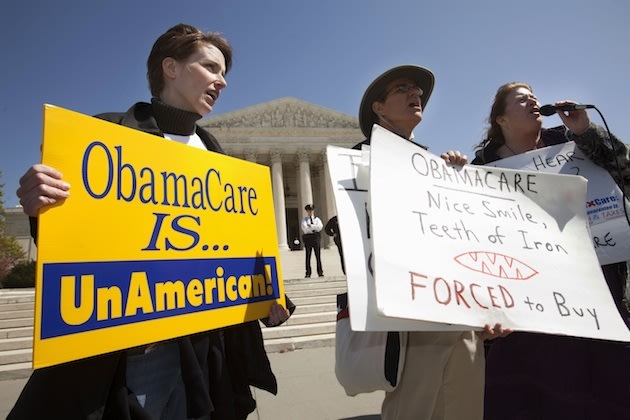Black voters boo Mitt Romney’s pledge to kill Obamacare during NAACP speech
Jul 11, 2012 – 12:38 PM ET | Last Updated: Jul 11, 2012 4:04 PM ET -- Source

REUTERS/Richard Carson
Republican presidential candidate Mitt Romney speaks at the NAACP convention in Houston July 11, 2012.
HOUSTON — Republican presidential candidate Mitt Romney made a major pitch to black voters Wednesday with a heavy emphasis on the economy, but he was booed when he promised to get rid of the Obama administration’s health care overhaul.
“I will kill every expensive and unnecessary program I can find, and that includes Obamacare,” Romney said, then waited and smiled through the crowd’s disapproval.
He faced another round of boos when he criticized President Barack Obama, who won 95% of the black vote in 2008 on the way to becoming the first African-American U.S. president and expects high support again in the November election.
Republicans and Democrats said Romney was making a statement just by speaking to the oldest U.S. civil rights group. His speech tried to show independent and swing voters that his campaign is inclusive.
“If equal opportunity in America were an accomplished fact, then a chronically bad economy would be equally bad for everyone,” Romney told the annual meeting of the National Association for the Advancement of Colored People. “Instead, it’s worse for African Americans in almost every way.”
The economy is the main issue in this year’s tight presidential race. And with the U.S. unemployment rate stuck at 8.2%, it is an area where Obama is especially vulnerable.
The unemployment rate among blacks is even higher at 14.4%. Romney argued he’s best suited to create more jobs. He also mentioned his plan to increase school choice — he’s called education the “civil rights issue of our era.”
“I want you to know that if I did not believe that my policies and my leadership would help families of colour — and families of any colour — more than the policies and leadership of President Obama, I would not be running for president,” Romney’s speech said.
“The first thing you need to do is show up, so I ultimately think he’s doing the right thing,” said Rep. Tim Scott of South Carolina, one of two black Republicans in Congress. “What he’s saying to everyone is that he’s [running to become] America’s president and not just those folks he thinks he can get votes from right now. I think that’s a very important statement.”
“You’ve got to get credit for showing up — for being willing to go — no question,” said Karen Finney, a Democratic consultant who worked in the Clinton White House. “It’s more about your actions than it is about what you say.”

Nicholas Kamm/AFP/Getty Images
People listen to US Republican presidential candidate Mitt Romney address the National Association for the Advancement of Colored People (NAACP) annual convention in Houston on July 11, 2012. Romney brought his pro-jobs pitch to black voters Wednesday, aiming to poach defectors by arguing US President Barack Obama has left the economy "worse for African-Americans in almost every way."
Obama spoke to the NAACP convention during his 2008 campaign but doesn’t plan to speak this year. Instead, Vice-President Joe Biden will address the convention on Thursday.
In framing education as a civil rights issue, Romney was following in George W. Bush’s footsteps. At a sweeping address to the NAACP in 2000, Bush, then the Republican presidential nominee, said the education system should “leave no child behind” — and he labeled the “soft bigotry of low expectations” as part of the problem facing black students.
The likely 2012 Republican nominee has a personal history with civil rights issues. Romney’s father, George Romney, spoke out against segregation in the 1960s and as governor of Michigan toured his state’s inner cities as race riots wracked Detroit and other urban areas across the country. He went on to lead the Housing and Urban Development Department, where he pushed for housing reforms to help blacks.
Mitt Romney invoked that legacy Wednesday.
In recent months, Obama has approached race from an intensely personal perspective. After the shooting of unarmed black teenager Trayvon Martin by a neighbourhood watch volunteer in Florida — an act many blacks saw as racially motivated — Obama spoke directly to Martin’s parents from the Rose Garden. “If I had a son, he’d look like Trayvon,” Obama said.
But diminished enthusiasm for the president in the wake of the economic downturn could dampen black turnout. That could make the difference in Southern states Obama won in 2008, particularly North Carolina and Virginia.
Other factors could keep blacks away from voting booths. Romney’s address to the group came as Democrats and minority communities expressed concern over a series of tough voter identification laws in a handful of states. Critics say the laws could make it harder for blacks and Hispanics to vote.
“He’ll be standing in that room asking people for their votes at the same time that Republican legislators are trying to disenfranchise minority communities,” said Finney, the Democratic consultant.
Romney expressed support for such laws during a late April visit to Pennsylvania, which now has one of the toughest voter identification statutes in the nation. “We ought to have voter identification so we know who’s voting and we have a record of that,” Romney said then.

AP Photo/Evan Vucci
N. Scott Phillips of Baltimore, centre, and others, listen as Republican presidential candidate, former Massachusetts Gov. Mitt Romney speaks at the NAACP annual convention, Wednesday, July 11, 2012, in Houston, Texas.
———
Associated Press writer Kasie Hunt contributed to this report.

